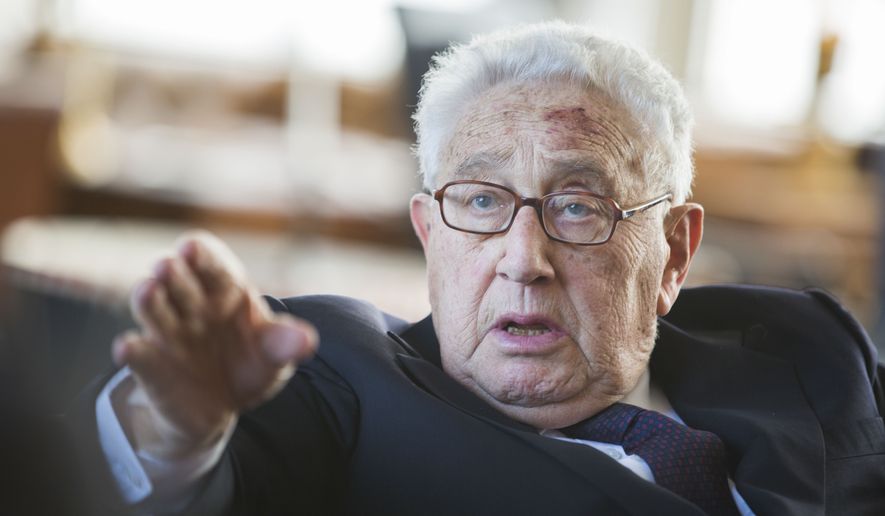Three secretaries of state from three past administrations painted a dark picture of global security during a rare joint appearance on Capitol Hill Thursday, warning that the international order has eroded more during the past 15 years than at any time since World War II — with threats posed by Iran, Russia and jihadi terrorists at the forefront.
However, Henry Kissinger, Madeleine Albright and George P. Shultz, who testified together before the Senate Armed Services Committee, also all agreed that, despite the rise of rivals such as China, the U.S. remains the world’s most influential and powerful nation with a responsibility to lead in the 21st century.
The hearing got off to a combative and colorful start when a sign-waving group of protesters from the activist group “Code Pink” suddenly burst up behind Mr. Kissinger, shouting that he should be arrested for “war crimes” for his record as serving under Richard Nixon and Gerald Ford.
Armed Services Committee Chairman John McCain lashed out at the protesters, who shouted slogans blaming Mr. Kissinger for a secret Vietnam-era U.S. bombing campaign inside Cambodian territory, along with the use of Agent Orange chemicals.
“Get out of here, you low-life scum,” barked Mr. McCain, himself a Vietnam veteran and former prisoner of war, as Capitol Hill police escorted the demonstrators out of the hearing room.
The Senate hearing was the third in a series in recent months designed to get perspective from the country’s former top diplomats and thinkers on the nation’s big-picture foreign policy and strategy goals.
SEE ALSO: Obama-released Taliban member swapped for Bowe Bergdahl tried to return to terror
“For all the turmoil this young century has brought, America remains, by far, the world’s mightiest economic and military power with a resurgent economy and an energy revolution,” testified Mrs. Albright, who served under President Bill Clinton. “We are the only nation with not just the capacity and will to lead, but also the ideals to do so in a direction that most of the world would prefer to go towards liberty, justice, peace and economic opportunity for all.”
Mr. Kissinger said the U.S. now faces a “more diverse and complex array of crises since the end of the Second World War.”
“For the first time in history, every region now interacts in real time and affects each other simultaneously,” he said.
“The problem of peace was historically posed by the accumulation of power — the emergence of a potentially dominant country threatening the security of its neighbors,” the 91-year-old former secretary of state said. “In our period, peace is often threatened by the disintegration of power — the collapse of authority into non-governed spaces, spreading violence beyond their borders and their regions.”
“This has led to the broadening of the challenge of terrorism, from a threat organized essentially from beyond borders to a threat with domestic networks and origins in many countries of the world,” said Mr. Kissinger, who asserted that American military power will continue to “play an eventful role in upholding a favorable international balance, restraining, destabilizing rivalries and providing a field for economic growth and international trade.”
Mr. Shultz, who served under President Reagan, suggested in his testimony that the Obama administration has not done enough to confront the ongoing rise and of extremist terrorism.
“The magnitude of a threat posed by terrorism is so great that we cannot afford to confront it with halfhearted and poorly organized measures,” he said. “Terrorism is a contagious disease that will inevitably spread if it goes untreated. We cannot allow ourselves to become the Hamlet of nations, worrying endlessly over whether and how to respond.”
All three former secretaries said Congress and the White House have failed to hold a real debate over the campaign against the Islamic State group, also known as ISIS and ISIL, in Syria and Iraq. The administration has justified its current anti-ISIS military campaign by citing authorizations for the use of military force that Congress passed years before the current iteration of the extremist group emerged.
“My experience is as an administration official you get a much better policy and you get a much better ability to execute that policy if it is discussed, and there is consultation between the administration and the Congress,” Mr. Shultz said.
Mrs. Albright noted President Obama had asked during his recent State of the Union address for Congress to pass a new authorization. But, she said, there “needs to be discussion of it and consultation.”
Mr. Kissinger agreed, but added, “we should not let this conflict with ISIS slide into the pattern of the previous wars, which start with support and after awhile degenerate into a debate about withdrawal.”
“Once America has engaged itself, victory is really an important objective,” he said.
• Guy Taylor can be reached at gtaylor@washingtontimes.com.




Please read our comment policy before commenting.